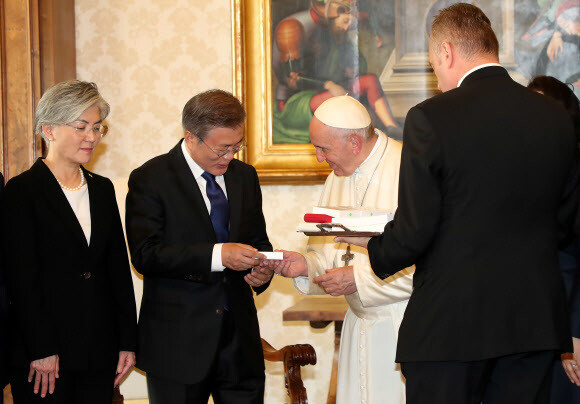hankyoreh
Links to other country sites 다른 나라 사이트 링크
[Editorial] Moon’s European tour elevated international interest in inter-Korean peace

On Oct. 21, South Korean President Moon Jae-in returned home after completing a nine-day trip to Europe. Moon’s trip can be praised for having achieved more noticeable results than any other European tour by a South Korean president in the past. It is particularly significant in the extent to which it elevated the government’s plan for establishing peace on the Korean Peninsula into a topic that attracts interest not only in Northeast Asia but also throughout Europe.
The greatest achievement of Moon’s trip was Pope Francis’s acceptance of North Korea’s invitation to visit. Considering that the Pope is a spiritual leader of the global Catholic Church and exerts a great degree of global influence, it’s safe to assume that his very acceptance of the idea of visiting the North will be a great boon for the peace process on the Korean Peninsula. The pope’s visit could be a crucial opportunity to bring North Korea out of isolation and into the community of nations while simultaneously promoting denuclearization.
It’s also likely to have the effect of prodding the US administration, under President Donald Trump, to speed up its negotiations with the North. The South Korean government needs to concentrate its diplomatic resources on enabling the Pope’s visit to the North to take place soon.
Another thing accomplished during Moon’s trip to Europe was initiating an international discussion about the question of easing sanctions on North Korea. During a series of summits with the leaders of France and the UK, both of which are permanent members of the UN Security Council, Moon emphasized the need to ease sanctions on North Korea, once its denuclearization reaches an irreversible point.
Moon brought up the same issue during a summit with Germany, which plays a leading role in the EU. It’s quite significant that Moon has sparked an international discussion of the idea that easing sanctions, and not just an end-of-war declaration, can be a measure corresponding to North Korea’s denuclearization.
Some are concerned that raising the topic of easing sanctions before the US may create friction with the US, but there’s no reason to hold such a view. The Trump administration finds itself forced to pay attention to the skepticism toward North Korea that is widespread in mainstream US society. In light of that fact, taking the initiative in raising the issue of easing sanctions and shaping international opinions on the subject can be regarded as a chance to give the Trump administration more room to maneuver. We must not forget that proactive steps by the South Korean leadership are helping to facilitate the improvement of North Korea-US relations.
At the same time, the fact that European leaders expressed reserve about immediately easing sanctions on North Korea can be taken as showing the need for the South Korean government to devote more time and effort to the issue. Now that the issue of easing sanctions has been made public, the government should make the case to related countries, including North Korea and the US, with the aim of getting results more quickly. If it’s not feasible to ease sanctions on North Korea right away, another option would be to push for Mt. Kumgang tourism and the Kaesong Industrial Complex to be granted exemptions from the sanctions.
Please direct comments or questions to [english@hani.co.kr]

Editorial・opinion
![[Editorial] Intensifying US-China rivalry means Seoul must address uncertainty with Beijing sooner than later [Editorial] Intensifying US-China rivalry means Seoul must address uncertainty with Beijing sooner than later](https://flexible.img.hani.co.kr/flexible/normal/500/300/imgdb/original/2024/0517/8117159322045222.jpg) [Editorial] Intensifying US-China rivalry means Seoul must address uncertainty with Beijing sooner than later
[Editorial] Intensifying US-China rivalry means Seoul must address uncertainty with Beijing sooner than later![[Column] When ‘fairness’ means hate and violence [Column] When ‘fairness’ means hate and violence](https://flexible.img.hani.co.kr/flexible/normal/500/300/imgdb/original/2024/0516/7417158465908824.jpg) [Column] When ‘fairness’ means hate and violence
[Column] When ‘fairness’ means hate and violence- [Editorial] Yoon must stop abusing authority to shield himself from investigation
- [Column] US troop withdrawal from Korea could be the Acheson Line all over
- [Column] How to win back readers who’ve turned to YouTube for news
- [Column] Welcome to the president’s pity party
- [Editorial] Korea must respond firmly to Japan’s attempt to usurp Line
- [Editorial] Transfers of prosecutors investigating Korea’s first lady send chilling message
- [Column] Will Seoul’s ties with Moscow really recover on their own?
- [Column] Samsung’s ‘lost decade’ and Lee Jae-yong’s mismatched chopsticks
Most viewed articles
- 1Celine Song says she’s gratified global audiences have responded to the kismet of ‘inyeon’
- 2[Editorial] Transfers of prosecutors investigating Korea’s first lady send chilling message
- 3[Exclusive] Unearthed memo suggests Gwangju Uprising missing may have been cremated
- 4[Column] US troop withdrawal from Korea could be the Acheson Line all over
- 5For new generation of Chinese artists, discontent is disobedience
- 6Xi, Putin ‘oppose acts of military intimidation’ against N. Korea by US in joint statement
- 7Highly educated high-earners at risk of being replaced by AI, BOK study says
- 8Could Korea’s Naver lose control of Line to Japan?
- 9[Editorial] Intensifying US-China rivalry means Seoul must address uncertainty with Beijing sooner t
- 10Japan begins dumping irradiated Fukushima water amid outpouring of concern about vague timeline